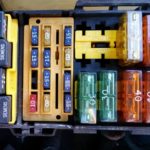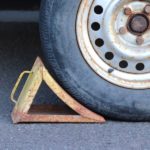Quick Navigation
Many problems can result in a Silverado’s failure to start after turning on your key. It can make diagnosing the trouble even more frustrating.
The issues can range from simple fuel shortage to a broken starter or an empty battery.
There might also be defects in the fuel pump, electrical system, or the ignition lock, paralyzing your vehicle.

Depending on the weight of the failure, you can check for possible fundamental issues before calling the breakdown service or workshop for assistance.
Here are some possible reasons why your Silverado ignition key will not turn.
Empty Battery
If you have been driving for a long time, most likely, you have noticed that most car start-up issues occur on colder days, especially during winter.
During cold seasons, freezing temperatures clog vehicle batteries, reducing their capacities. As a result, your battery may never fully charge while driving.
It is why most start-up problems occur on cold days in winter.
If your starter barely turns on, it is possible that your Silverado won’t respond when the ignition key is turned.
Corroded connections between the battery and the body can also prevent the battery from being charged while driving.
To check on the battery condition, you can monitor the power storage. You can do this by switching on the interior lighting.
If the light dims when trying to start your Silverado truck, you might have a flat battery. However, you can only check the battery’s charge level reliably using a voltameter.
How To Fix It
For the track to start when the battery is empty, you will need to jump-start it. Always ensure you have a suitable jumper cable in the trunk while driving.
With jump-starting, the battery will receive enough current from another vehicle to start the car.
Defective Alternator
Like an empty battery, a bad alternator is another possible reason your truck does not start when you turn the key.
The alternator is an essential electric component of the vehicle that recharges the battery and distributes electricity to the vehicle.
If you turn your Silverado car key and nothing happens, your alternator could be the problem.
How To Fix It
Unlike an empty battery, a bad alternator has no quick fix. You’ll have to get a mechanic to examine your car.
If your alternator is damaged, you’ll need to replace it. If not checked, a defective alternator may damage your car’s battery.
Defective Starter Motor
If the battery is Okay, but your Silverado isn’t responding when the ignition key is turned, your starter motor could be defective.
Starter motors are prone to wear with prolonged use. A starter motor uses the current from the battery to get the engine running.
A faulty magnetic switch on the starter is another possible reason my truck won’t start when you turn the key.
When trying to start your track, a clicking sound is usually a warning sign that your starter motor is defective.
How To Fix It
Repairing the starter is usually difficult because it lies deep in the engine compartment, making it difficult to reach. It is widespread with old vehicles.
If examining the car is on a lift, the starter motor can be replaced as a precaution.

Empty Fuel Tank
If your Silverado key doesn’t turn the ignition, your fuel tank could be low or empty. It is because vehicles require a certain level of fuel for the engine to start.
Sometimes you can forget to fill up your fuel tank, or you could run out of gas when driving a long distance. Here are some signs that the fuel tank is empty:
The fuel gauge indicates empty
If your fuel shows on the dashboard that your car is low on gas, it is best to fill it up immediately. It is the easiest and quickest way to assess your fuel level.
The car stalls
A typical sign of an empty tank is an engine that ignites briefly but then goes out again immediately.
Although it is possible to start a car with very little fuel, there is a high chance the vehicle will begin stalling right after it starts or shortly after driving away.
It is due to fuel residues that still get into the engine.
How To Fix It
It would help if you never waited until your vehicle completely consumed the fuel for you to fill up your fuel tank. Doing this could damage your vehicle.
If you notice your car is experiencing any of these signs, get gas at the nearest station immediately, or contact roadside assistance.
When planning to drive long-distance, it’s vital to ensure your fuel tank has sufficient fuel.
With a gasoline engine, it is usually sufficient to refill the gas tank and start the car when it runs empty. In diesel engines, you should bleed the fuel system.
Fuel System Problems
When you turn the key in the Silverado car, and nothing happens, there might be problems in your fuel system.
Even though there might be sufficient fuel in the tank, it may still not get into the cylinders, preventing the engine from starting.
The problems can be caused by a defective fuel pump or injection system, leading to starting problems.
How To Fix It
It is complicated to repair defective parts of the fuel system, so a car repair workshop must replace them.
However, the starting problems can be solved relatively easily with the correct setting.
Bad Ignition Switch
The ignition switch carries power from the battery to the car’s components. A bad ignition switch prevents power from reaching the starter or ignition system.
It makes it impossible for the vehicle to start when turned on.
How To Fix It
If your ignition switch is damaged, you should immediately seek a mobile auto repair solution. However, the problem can be easily prevented by carrying a lighter key.
A heavy keychain can strain the ignition when the key is exerted.
Other Causes
Marten damage is another cause of starting problems. Animals can bite cables and wires in cars, affecting electrical circuits or the fuel and oil supply.
You should also check on defective spark plugs or glow plugs and loose plug connections on the ignition cables as they can prevent the vehicle from starting.
Other possible causes include engine damage, moisture in the engine, defective crankshaft sensor, clogged fuel line, and a flooded carburetor.
Conclusion
There are many reasons why the vehicle does not start after turning it on. However, it is not always apparent that the battery is empty.
If you are not a car repair expert, you should not rush in with a self-care diagnosis.
It’s advisable to call a breakdown service or workshop if you are experiencing defective car parts.

Patrick started his love affair with cars in his childhood. Over the years, he claims a sturdy hold on his driving skills, along with a thorough understanding of cars. We can expect some interesting, holistic, and pleasurable blogs with his flair for writing and his love for cars.
Being a car enthusiast, Patrick has experience comprising of two decades in which he has ridden some of the meanest and strongest machines in the automotive industry. His previous avatars include an automotive professional, photographer, and journalist, and you will certainly experience the roundness of experience in his piece on this site.
In his second decade of reviewing cars and analyzing tools, Patrick is all set to give you convincing, reliable, and the latest information regarding what’s happening in the automotive industry. Currently, he owns a BMW Z3 but cannot get his eyes off Aston Martin DB5. He is a car enthusiast; he loves cooking and listening to music, especially jazz. Here are some of the pieces written by our ace author.






